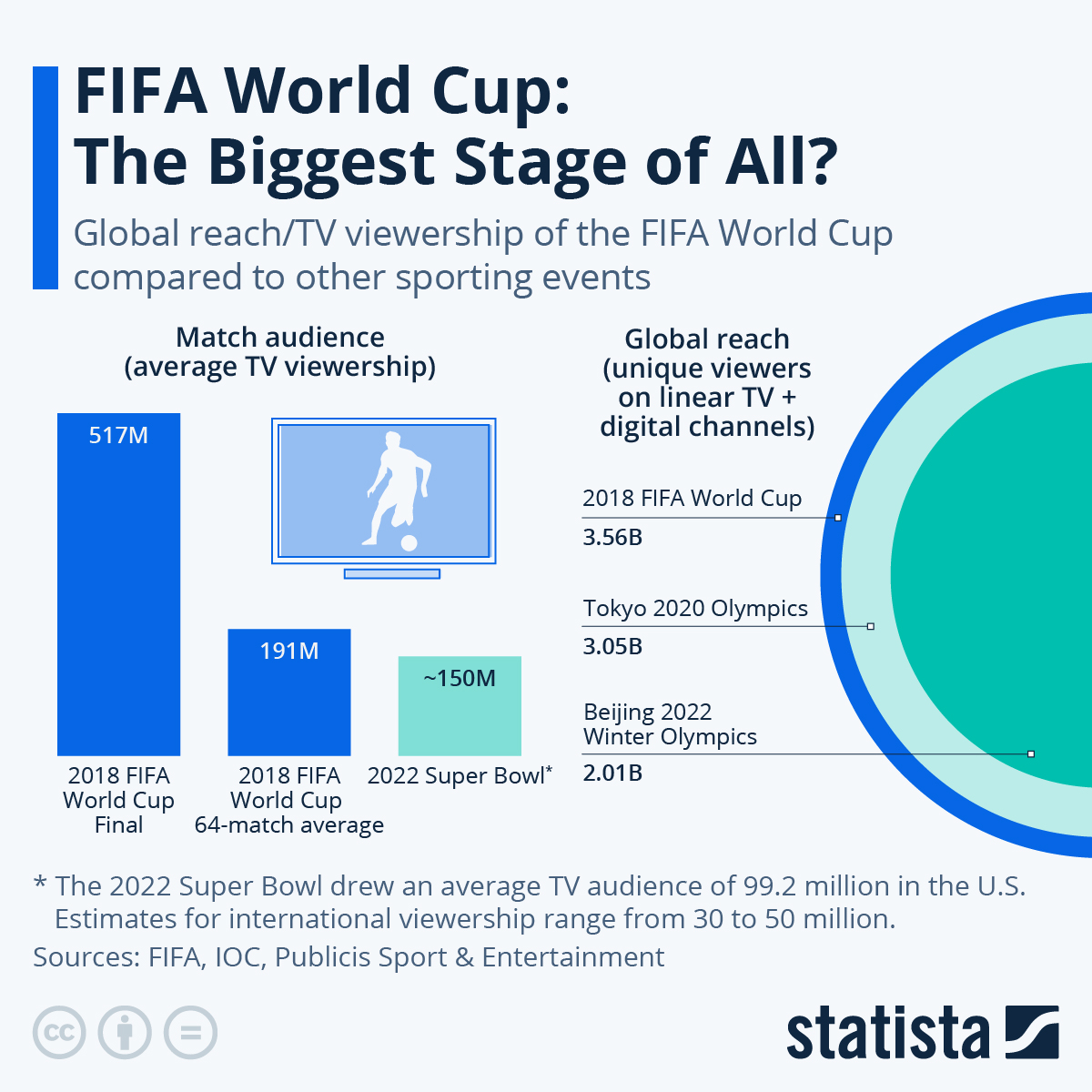
When Qatar and Ecuador kick off the 2022 FIFA World Cup on Sunday, it is the beginning of what is arguably the biggest sporting event in the world. While maybe not the greatest spectacle in sports – that honor goes to the Super Bowl, which is bridging the gap between sports and entertainment unlike any other event – the quadrennial FIFA World Cup is probably the most followed competition in the world of sports.
Taking the Super Bowl as a measuring stick reveals the extraordinary scale of the World Cup’s global appeal. As Statista's Felix Richter reports, according to FIFA, the average live TV audience for the 64 matches at the 2018 World Cup in Russia was 191 million.
That’s significantly more than estimates for the Super Bowl’s TV viewership, which was just short of 100 million in the U.S. this year plus an estimated 30 to 50 million across the globe.
Keep in mind, it’s not the World Cup final we’re talking about, it is every single one of the 64 matches played over the course of a month.
The final is at another level altogether, with the 2018 clash between France and Croatia drawing an average TV audience of 517 million people, as live coverage of the game reached more than a billion people in total.
You will find more infographics at Statista
Looking at the overall reach of the FIFA World Cup, it even puts the Olympics to shame. In 2018, an estimated 3.56 billion people watched at least one minute of World Cup coverage on linear TV or across digital channels, compared to 3.05 billion for the Tokyo 2020 Olympics and 2.01 billion for the Beijing 2022 Winter Games. And Russia 2018 was no outlier in that respect: Brazil 2014 reached similar numbers and so did South Africa 2010 before it. The matter of fact is that football truly is a global game, played and followed across the globe like no other sport. Whether the controversial decision to award the 2022 World Cup to Qatar will affect the event’s reach is yet unclear, but polls suggest that, all criticism aside, hundreds of millions of football fans will tune in once the ball is actually rolling.
When Qatar and Ecuador kick off the 2022 FIFA World Cup on Sunday, it is the beginning of what is arguably the biggest sporting event in the world. While maybe not the greatest spectacle in sports – that honor goes to the Super Bowl, which is bridging the gap between sports and entertainment unlike any other event – the quadrennial FIFA World Cup is probably the most followed competition in the world of sports.
Taking the Super Bowl as a measuring stick reveals the extraordinary scale of the World Cup’s global appeal. As Statista’s Felix Richter reports, according to FIFA, the average live TV audience for the 64 matches at the 2018 World Cup in Russia was 191 million.
That’s significantly more than estimates for the Super Bowl’s TV viewership, which was just short of 100 million in the U.S. this year plus an estimated 30 to 50 million across the globe.
Keep in mind, it’s not the World Cup final we’re talking about, it is every single one of the 64 matches played over the course of a month.
The final is at another level altogether, with the 2018 clash between France and Croatia drawing an average TV audience of 517 million people, as live coverage of the game reached more than a billion people in total.
You will find more infographics at Statista
Looking at the overall reach of the FIFA World Cup, it even puts the Olympics to shame. In 2018, an estimated 3.56 billion people watched at least one minute of World Cup coverage on linear TV or across digital channels, compared to 3.05 billion for the Tokyo 2020 Olympics and 2.01 billion for the Beijing 2022 Winter Games. And Russia 2018 was no outlier in that respect: Brazil 2014 reached similar numbers and so did South Africa 2010 before it. The matter of fact is that football truly is a global game, played and followed across the globe like no other sport. Whether the controversial decision to award the 2022 World Cup to Qatar will affect the event’s reach is yet unclear, but polls suggest that, all criticism aside, hundreds of millions of football fans will tune in once the ball is actually rolling.







